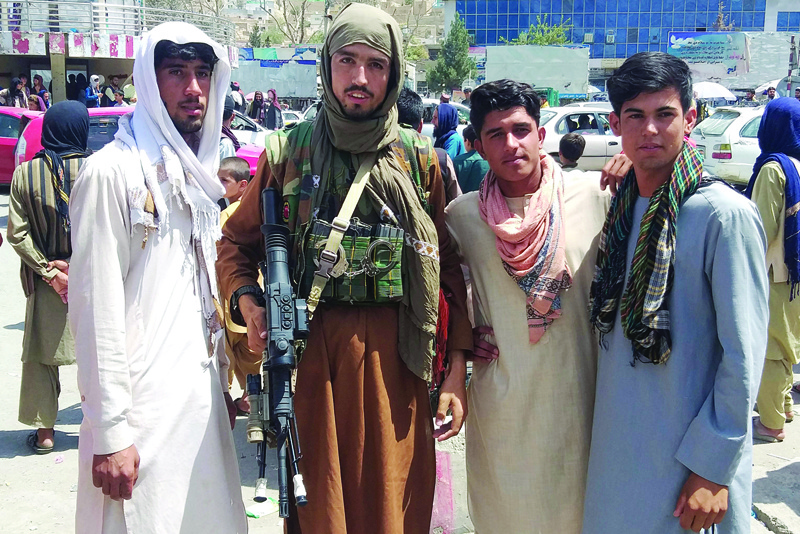 PUL-E-KHUMRI: A Taleban fighter is seen with locals yesterday after the Taleban captured the capital of Baghlan province. - AFP
PUL-E-KHUMRI: A Taleban fighter is seen with locals yesterday after the Taleban captured the capital of Baghlan province. - AFPKUNDUZ: As residents of Kunduz fled the northern Afghan city in fear for their lives this week, its Taleban captors were all smiles. One bearded fighter patrolling the city, clad in camouflage with a gun slung over his shoulder, beamed ear-to-ear as he offered a friendly handshake to an arm extended from a car window. Buoyed by a foreign troop withdrawal that is due to end later this month, the hardline Islamist group's rank-and-file have flooded the streets of Kunduz and other provincial capitals after capturing them in a rapid advance since the weekend.
Nine cities have fallen to the insurgents in the last week - some without a fight - in a lightning offensive that has seen mostly northern population centers fall like dominoes. Kunduz's last line of defense appeared to collapse yesterday as hundreds of Afghan soldiers who retreated to a nearby airport surrendered, a local lawmaker told AFP.
Victorious fighters in militant garb now police the city on the backs of motorcycles or humvees taken from the overrun Afghan forces, while others pose for photographs with captured weaponry. They also received a warm welcome 100 km south in Pul-e-Khumri, where young men swarmed their gun-toting Taleban occupiers for selfies just hours after security forces were overpowered and the city fell to the insurgents.
With police cars now sporting the distinctive white flag of the Taleban - which also now looms over the city square - there were few outward signs of the heavy fighting that had taken place as civilians went about their day under the watchful eyes of their motorbike-riding rulers. But those who have fled the frontlines have brought tales of horror wrought by the hardline Islamist group, detailing reprisals against former government workers, summary executions, beheadings, and kidnappings of girls for forced marriages. Shops in Kunduz's markets were left blackened and burnt out by the fighting between Afghan forces and the Taleban.
'Fear in their eyes'
During their first stint in power - from 1996 until their toppling by US-led forces soon after the Sept 11, 2001 attacks - the Taleban earned notoriety for a strict interpretation of Islamic law that punished even petty crimes with public floggings and executions. The Taleban captured Kunduz - capital of the province of the same name - in two brief offensives in 2015 and 2016, before Afghan forces heavily backed by US firepower ousted them from the city. The first lasted two weeks, and the second just a day.
Despite the latest Taleban occupation and the return of alleged atrocities, life seemed to be resuming in Kunduz. Tuk-tuks whizzed by the rubble from an explosion, taxis tooted their horns and cyclists pedaled past a raised Taleban flag in the city's main square. But residents said they were scared about a return to prolonged Taleban rule and, with the United States all but gone from the battlefield, they appeared to be preparing for worse this time around. "People are opening their shops and businesses, but you can still see fear in their eyes," said shopkeeper Habibullah. - AFP









